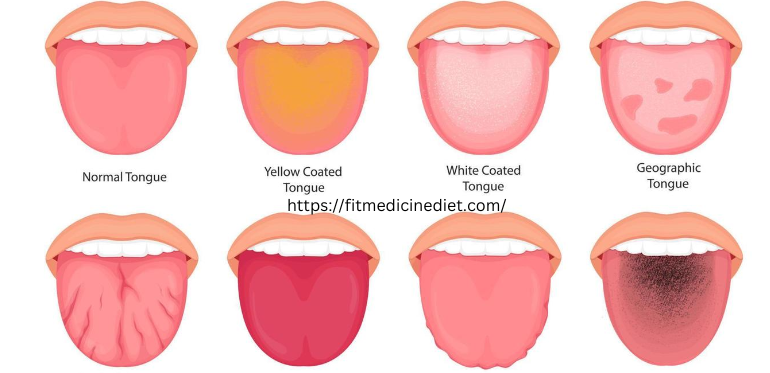
Tongue Health Chart
Understanding and Maintaining 100% Your Oral Wellness
Tongue health chart often goes unnoticed in daily oral hygiene routines, yet it plays a significant role in our overall well-being. The condition of your tongue can indicate various aspects of your health, from simple dehydration to underlying medical conditions. Understanding the nuances of tongue health is crucial for maintaining good oral hygiene and overall health.
Anatomy of the Tongue health chart
The tongue is a muscular organ located in the mouth, primarily composed of muscle fibers. Its surface is covered in papillae, which contain taste buds responsible for detecting flavors. The tongue aids in functions such as chewing, swallowing, and speaking.
Common Tongue Health Issues in Tongue health chart
Bad Breath (Halitosis)
Halitosis, or bad breath, can be caused by poor oral hygiene, dry mouth, or underlying health issues. The bacteria on the tongue’s surface can contribute to foul-smelling breath.
Tongue Discoloration
Discoloration of the tongue can result from various factors, including smoking, certain foods or beverages, and oral infections.
Geographic Tongue
Geographic tongue is a condition characterized by irregular patches on the tongue’s surface, giving it a map-like appearance. While typically harmless, it can cause discomfort or sensitivity.
Thrush (Oral Candidiasis)
It can result in white patches on the tongue and inner cheeks, accompanied by discomfort or pain.
Signs of Healthy Tongue according to Tongue health chart
A healthy tongue typically has a pinkish color, smooth texture, and moist surface. It should be free of any coating or unusual spots.
Maintaining Tongue Health
Proper oral hygiene, including regular brushing and tongue scraping, is essential for maintaining tongue health. Additionally, staying hydrated and consuming a balanced diet rich in fruits and vegetables can support oral wellness.
Tongue Scraping
Tongue scraping is a practice that involves using a specialized tool to gently remove bacteria, food particles, and debris from the tongue’s surface. It can help improve breath odor and reduce the risk of oral infections.
Natural Remedies for Tongue Health
Simple remedies like saltwater rinses, aloe vera gel application, and oil pulling with coconut oil can contribute to tongue health by reducing inflammation and promoting oral hygiene.
When to See a Doctor
Persistent symptoms such as chronic bad breath, unusual changes in tongue appearance, or persistent discomfort should prompt a visit to a healthcare professional for further evaluation.
Preventing Tongue Injuries
Avoiding habits like tobacco and excessive alcohol consumption, as well as being cautious while eating, can help prevent tongue injuries and maintain oral health.
Impact of Lifestyle on Tongue Health
Factors such as smoking, alcohol consumption, and diet habits can significantly impact tongue health. Making healthy lifestyle choices can contribute to overall oral wellness.
Tongue health chart and Overall Well-being
The condition of the tongue can reflect systemic health issues such as nutritional deficiencies, autoimmune diseases, and infections. Taking a holistic approach to health, including oral hygiene, is essential for overall well-being.
Children’s Tongue Health
Monitoring children’s tongue health is crucial for early detection of issues such as tongue tie, thrush, or oral injuries. Establishing good oral hygiene habits from a young age sets the foundation for lifelong oral wellness.
Frequently Asked Questions about Tongue health chart
What causes a white-coated tongue?
A white-coated tongue can result from various factors, including oral infections, dehydration, or smoking.
Can tongue brushing replace scraping?
While brushing the tongue can help remove some debris, tongue scraping is more effective in removing bacteria and food particles.
Is tongue discoloration always a sign of illness?
Not necessarily. Tongue discoloration can result from harmless factors like food or beverage consumption, but it can also indicate underlying health issues.
How often should I scrape my tongue?
Ideally, you should scrape your tongue once a day as part of your oral hygiene routine, preferably in the morning before brushing your teeth.
Can poor tongue health affect taste sensation?
Yes, poor tongue health can affect taste sensation by altering the distribution of taste buds or causing inflammation that affects taste perception.
Conclusion about Tongue health chart
Maintaining Tongue health chart is integral to overall oral wellness and can provide valuable insights into our general health. By understanding the signs of a healthy tongue, practicing proper oral hygiene, and seeking medical attention when necessary, we can ensure optimal tongue health and enhance our overall quality of life.


